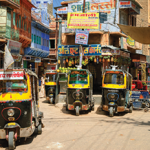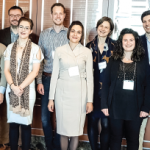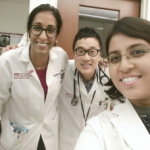The doctors have a wide repertoire of knowledge, not only because they see pediatric rheumatology cases as well as adult, but also because the patients come in with a wide variety of diseases. Infectious diseases are very common. Because India’s population is very large, rheumatology fellows have a good chance of seeing rare diseases as well. I saw two to three vasculitis patients a day. To put this in perspective, I had seen about seven active vasculitis cases during the course of my entire fellowship.
The doctors talk to the patients about spiritual and religious beliefs, because that is a big factor in patients’ compliance with modern medications. They also instruct patients on basic physical therapy.
I was also very impressed with the telemedicine services. SGPIMS does a lot of telemedicine outreach for rural areas and also has periodic medical vans reach out to patients in the community.
There is good face-to-face collaboration between fellows and different departments. I had a chance to observe the doctors’ lounge, which has long since disappeared in most of our U.S.-based hospitals, having been replaced by in-basket messaging within the electronic medical record.
Once a month, rheumatology fellows meet with fellows from a neighboring institution for dinner to discuss interesting cases. It was very encouraging to see not only interdisciplinary collaboration, but also collaboration within the same discipline from different institutions.
SGPIMS has taken the concept of doctor wellness to a whole new level. The 400 acre campus on the outskirts of the city is home to 200 species of birds that are found nowhere else in India. There is an emphasis on coexisting with nature. There are excellent sports facilities for doctors, including swimming pools and tennis courts.
Challenges in India
Healthcare issues that India has tackled very well: Generics in India are very affordable; biosimilars have made inroads. There is no pay for delay that makes long-standing drugs ever more costly in the U.S. Methotrexate and plaquenil are affordable; therefore, triple therapy is optimized before resorting to biologics.
Biologics and biosimilars are also much cheaper in India and affordable to the middle class. A few examples of price points: secukinumab costs less than $2,000 a year; apremilast, $20 a month.
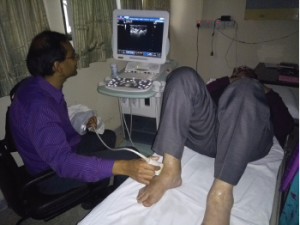
Dr. Bhatt performs a bedside musculoskeletal ultrasound.
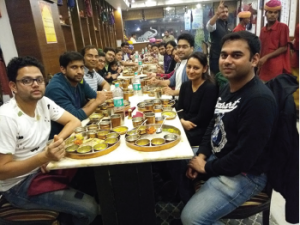
Dr. Bhatt (left side, striped shirt) and the Sanjay Gandhi Postgraduate Institute of Medical Sciences rheumatology fellows at a farewell dinner.
